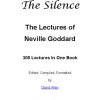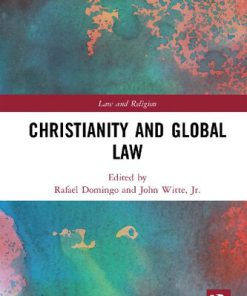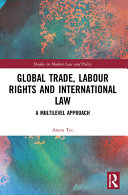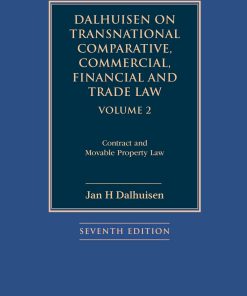Religion and Contract Law in Islam From Medieval Trade to Global Finance 1st Edition by Valentino Cattelan 1138504041 9781138504042
$50.00 Original price was: $50.00.$25.00Current price is: $25.00.
Religion and Contract Law in Islam From Medieval Trade to Global Finance 1st Edition by Valentino Cattelan – Ebook PDF Instant Download/Delivery: 1138504041, 9781138504042
Full download Religion and Contract Law in Islam From Medieval Trade to Global Finance 1st Edition after payment
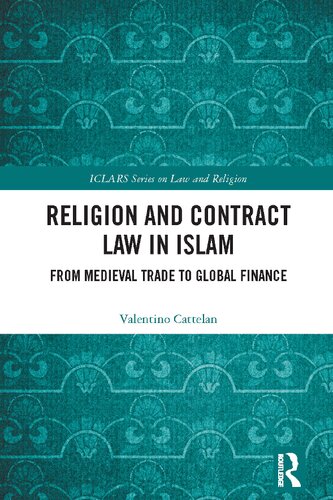
Product details:
ISBN 10: 1138504041
ISBN 13: 9781138504042
Author: Valentino Cattelan
What is a contract in Islam? Is it an aspect of Muslim religion or of secular life? How much has it changed over the centuries? Undertaking a search that spans revelation, legal tradition, and the reality of the Muslim world, this book explores the Islamic contract (‘aqd in Arabic) as a ‘city’ at the crossroads of convergent paths of translation, comparison, and law in context. In particular, the book shows that only by re-orienting traditional categories of Western law-religion toward the East can an alternative path of discovery for the ‘aqd be advanced. Hence, through a fortuitous encounter with an Arab Girl, the reader will (re-)visit the Temple of Western modernity and explore a city ruled by Towers of dialectical forces, carrying a hermeneutical Ring that combines dialectics, Islamic studies, and media theory. This interdisciplinary approach will not only enrich our knowledge of the ‘aqd but also make it more understandable as a cultural and social construction to which both Muslims and non-Muslims have participated in forging its multiple representations. By inviting the readers ‘to know who they are’ while looking at her, the Arab Girl is already waiting for us to listen to the Islamic contract in a new way. By applying a distinctive law and religion approach to the study of the contract in Islam, the book provides a comprehensive exploration of a topic that is of interest to legal and economic comparatists as well as to readers in anthropology, Islamic and cultural studies, and it is also of topical meaning for today’s international lawyers and the operators of an increasingly multicultural and transnational market.
Religion and Contract Law in Islam From Medieval Trade to Global Finance 1st Table of contents:
1 Expelling the merchants from the Temple: methodology and the contents of this book
1.1. One Ring, some daemons, and Jesus Christ: the non-identity (1M) of law and religion
1.2. The problem at the heart of this book
1.3. Some conceptual help from three companions
1.3.1. How to compare? Non-identity, dialectic, and transformative praxis (Bhaskar)
1.3.2. What is Islam? Unity as plurality in the Muslim world (Ahmed)
1.3.3. How to deal with law-religion in Islam? Visual vs acoustic space (McLuhan)
1.4. Carrying the One Ring in the practice of trade: revelation, tradition, and reality
2 The revealed Word in translation: the space of law and religion in Islam
2.1. Babel, languages, and the sacred law of Islam
2.2. Profanations: religious vs secular in the Temple of Western modernity
2.3. An absence of religion? Translating the non-identity of dīn as Islamic bíos
2.4. The revelation of Islam: the Wor(l)d and its understanding
2.4.1. Translating Šarī‘ah in human life: the normative science of fiqh
2.4.2. The dictum of the revelation as pre-scribed Law and the uṣūl al-fiqh
2.4.3. Furū‘ al-fiqh as de-scribed law in a iurisdictio of verdicts
2.4.4. From the rule (ḥukm) to the right (ḥaqq): an instance of action in the wor(l)d
2.4.5. Echoing the revelation in an acoustic space: a sacred law without corpus
2.5. The bridge of Babel: from the negation of fiqh (2E) to the comparison of the ‘aqd
3 Comparing legal traditions: contract law and Muslim fiqh
3.1. The ‘aqd as a craft of place in the space of Islam
3.2. A map of the city? The Two Towers and the plural itineraries of the madhāhib
3.3. ‘Aqd and Islamic dīn
3.3.1. The rule (ḥukm al-‘aqd), its subject, and its object: from legal capacity (ahliyya) and personality (dhimma) to the duty (wujūb) of the mukallaf
3.3.2. Religious qualifications (al-aḥkām al-khamsa) and the legal validity of the šar‘ī act, its constitutive (arkān) and conditional (šurūṭ) elements
3.3.3. At the borders of the city: the act of disposal (taṣarruf) in relation to contractual rights (ḥuqūq al-‘aqd)
3.4. The role of human will and rationality in the psychological formation of the ‘aqd
3.4.1. Autonomie de la volonté and the ‘reason’ underlying the contract: ‘illa and sabab in comparison with the civilian cause and the consideration of common law
3.4.2. Freedom of contract, nominate contracts, and attached stipulations
3.4.3. Psychological components of the ‘aqd: will (irāda), intention (niyya), animus contrahendi (qaṣd), choice (khiyār), and individual consent (riḍā)
• Šāfi‘īs and Ḥanafīs: objectivism
• Mālikīs and Ḥanbalīs: subjectivism
3.4.4. The vices of consent (duress, ikrāh; fraud, tadlīs; mistake, ghalaṭ), misrepresentation, and the doctrine of al-khiyārāt
3.5. The construction of the ‘aqd as consensual transfer of properties
3.5.1. Expression (ṣīghah), verbalism, and the unity of negotiations (majlis al-‘aqd)
3.5.2. Offer (ījāb) and acceptance (qabūl) in the tarāḍī: what is the nature of the agreement in Muslim fiqh?
3.5.3. The subject matter (maḥall) of the contract (al-ma‘qūd ‘alayhi): exchanging properties (amwāl), either ‘ayn or dayn, in relation to the dhimma
3.5.4. The equilibrium of the contract and the doctrines of ribā, maysir, and gharar
• Ribā
• Gharar
• Maysir/Qimār
3.6. A unity of diversities: fiqh pluralism and the totality (3L) of the ‘aqd as the performance of God’s will
4 Realities of the Muslim world: changing contexts over time
4.1. Continuity, change, and transformative praxis (4D): fiqh and textual polities
4.2. Verbal Trade
4.2.1. Pre-Islamic customs, formalism, and the origins of the ‘aqd
4.2.2. Verbalism and documentary evidence in Muslim medieval trade
4.2.3. Legal devices (ḥiyal): contractual theories-into-practices
4.3. Codified Norm
4.3.1. The invention of a corpus for Islamic law and the ‘aqd: Western transplants and the codification process in Muslim countries
4.3.2. Embodying the West: Sanhūrī’s reformulation of sabab and ghalaṭ in the Egyptian Civil Code
4.4. Typewritten Market
4.4.1. Global capitalism and the invention of Islamic finance: a new life for the ‘aqd between authenticity and contamination
4.4.2. The textual polity of Shari‘ah-compliance
4.4.3. From fiqh legal texts to financial technology
4.5. Human agency and the urban designs of the ‘aqd
People also search for Religion and Contract Law in Islam From Medieval Trade to Global Finance 1st:
7 elements of contract law
6 elements of contract law
6 articles of faith in islam in arabic
6 islamic beliefs
Tags:
Valentino Cattelan,Contract,Religion,Medieval
You may also like…
Jurisprudence & Law - Legal Reference
Religion & Spirituality - Islam
Messianism and Sociopolitical Revolution in Medieval Islam 1st Edition Said Amir Arjomand
History - Asian History
Religion & Spirituality - Religious Studies
Christianity and Global Law (Law And Religion series) 1st Edition Rafael Domingo
Commercial & Financial Law
Uncategorized
Messianism and Sociopolitical Revolution in Medieval Islam 1st Edition Said Amir Arjomand
Commercial & Financial Law
Global Trade, Labour Rights and International Law: A Multilevel Approach 1st Edition Aneta Tyc
Commercial & Financial Law


